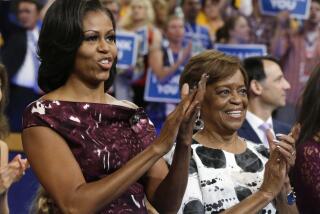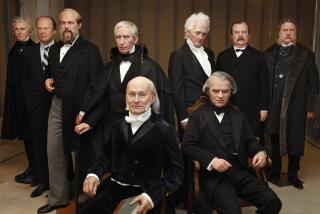Loving Mothers Key to Good Presidents, Scholars Find
PRINCETON, N.J. — Voters puzzling over the growing field of 1988 presidential contenders were offered an old-fashioned rule of thumb this weekend for making a choice--pick the candidate with the best mother.
More than 60 scholars and former Oval Office confidants gathered at Princeton University to analyze modern presidential leadership over the last half century, and the one point on which they appeared to agree was that the key to success in the presidency is a balanced and secure personality. And the best way for a President to develop such traits, according to Wilbur J. Cohen, whose judgment has been seasoned by service under six presidents, is “to have a mother who loves you and nurtures you.”
Cites Roosevelt, Kennedy
As examples to prove his point, Cohen cited the maternal care and affection lavished on Franklin D. Roosevelt, founder of the modern presidency, and John F. Kennedy, whom opinion polls show to be the most respected of Roosevelt’s eight successors to date.
Character--whether shaped by parental relationships or other factors--seemed to emerge from the two days of scholarly brainstorming and high-level gossiping as the decisive thread running through the presidency during the past half century.
The importance of character could easily be seen with Roosevelt. His biographer, William Leuchtenburg of the University of North Carolina, said Roosevelt was so self-assured that one associate claimed: “He must have been psychoanalyzed by God.”
This theme continues through to President Reagan, whose tenure, according to his pollster, Richard B. Wirthlin, has been characterized by “humor, optimism and the resilience that allowed him to rebound from adversity.”
In Reagan’s case, however, his conspicuous buoyancy appears to depend to some extent on the support and forebearance of his staff.
Avoids ‘Rushing In’
“You can’t have people rushing in (on the President) and talking about mistakes,” Reagan’s attorney general and longtime adviser, Edwin Meese III, told the conference. “The people around you can get you down,” Meese said, adding that Reagan’s aides “have a responsibility not to create self-doubt.”
As H. R. (Bob) Haldeman, President Richard M. Nixon’s chief of staff before he was convicted and imprisoned for his role in the Watergate scandal, said: “Each presidency is unique unto itself.”
Truman’s Homespun Appeal
Just as Roosevelt’s almost regal bearing bolstered his leadership qualities, Harry S. Truman’s appeal owed much to his lack of pretension.
“Truman was like an old shoe,” said former aide Ken Hechler, who recalled one White House visit when Truman banged out some old favorites on the piano and then told his guests that if he had not entered politics he would have made “a helluva good piano player” in a bordello.
If character has been the key to presidential strengths, it also has been a source of vulnerabilities, as it was for Lyndon B. Johnson. Desperate to project himself more favorably to the public, Johnson, on the advice of aides, experimented during one televised press conference with a more informal style, stepping away from the podium, taking off his glasses and clapping his hands for emphasis.
Everyone agreed that the result was effective, according to Johnson chronicler Larry Berman of the University of California, Davis, but Johnson abandoned the technique because the insecurity that plagued his presidency made him believe the informal approach was lacking in presidential dignity.
Dwight D. Eisenhower, in contrast, according to Fred Greenstein, the Eisenhower specialist who organized the conference at Princeton’s Woodrow Wilson Center, was so secure that he cultivated a public image of clumsiness in politics, thus making it easier for him to advance his political goals.
More to Read
Get the L.A. Times Politics newsletter
Deeply reported insights into legislation, politics and policy from Sacramento, Washington and beyond. In your inbox three times per week.
You may occasionally receive promotional content from the Los Angeles Times.









